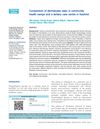23 citations,
May 2019 in “Stem cell research & therapy” iPSC-derived stem cells on a special membrane can help repair full-thickness skin defects.
 1 citations,
June 2023 in “Cells”
1 citations,
June 2023 in “Cells” Exosomes could be a promising way to help repair skin and treat skin disorders.

Off-label drug use can be risky but sometimes beneficial when standard treatments fail.
 October 2023 in “Clinical medicine and medical research”
October 2023 in “Clinical medicine and medical research” Thyroid function may influence hair loss after COVID-19.
 March 2020 in “Journal of Cosmetic Dermatology”
March 2020 in “Journal of Cosmetic Dermatology” Hair loss affects self-esteem; patients seek effective, low side-effect treatments.
 61 citations,
June 2022 in “Journal of Controlled Release”
61 citations,
June 2022 in “Journal of Controlled Release” Dissolving microneedles show promise for delivering medication through the skin but face challenges like manufacturing complexity and regulatory hurdles.
12 citations,
January 2021 in “Journal of Cutaneous and Aesthetic Surgery” Epidermal growth factor helps skin and hair regeneration but needs more research for better understanding.
 21 citations,
June 2022 in “Molecules”
21 citations,
June 2022 in “Molecules” Perilla frutescens, an East Asian plant, contains 400 bioactive compounds that have various health benefits, including anti-inflammatory, antidepressant, and anticancer effects, and can treat conditions like diabetes, skin allergies, and neurological disorders.
 22 citations,
November 2012 in “Journal of cosmetic dermatology”
22 citations,
November 2012 in “Journal of cosmetic dermatology” Stem cells can rejuvenate skin, restore hair, and aid in wound healing.
February 2023 in “Frontiers in Pharmacology” Water extract of Cacumen Platycladi helps hair growth by activating specific cell pathways.
 June 2024 in “Frontiers in immunology”
June 2024 in “Frontiers in immunology” Sequential therapy with dupilumab and baricitinib improved hair regrowth and atopic dermatitis in a child without adverse reactions.
 1 citations,
December 2022 in “BMC Plant Biology”
1 citations,
December 2022 in “BMC Plant Biology” The black orchid Brasiliorchis schunkeana produces chemicals that attract certain insects and have potential antimicrobial properties.
4 citations,
March 2022 in “BioEssays” Hydra can help understand human hair follicle microbiomes and develop new skin disease therapies.
 February 2023 in “IntechOpen eBooks”
February 2023 in “IntechOpen eBooks” Testosterone replacement therapy helps manage deficiency and has various methods, but requires careful monitoring to avoid side effects.
 59 citations,
October 2012 in “Pharmaceutical Research”
59 citations,
October 2012 in “Pharmaceutical Research” Squalene-based carriers improve delivery of a treatment to hair follicles for alopecia areata.
 5 citations,
January 2014 in “Indian Journal of Dermatology, Venereology and Leprology”
5 citations,
January 2014 in “Indian Journal of Dermatology, Venereology and Leprology” Non-infectious skin conditions are more common than infectious ones in Kashmir, but community areas see more infections, suggesting a need for better skin care services in primary health care.
 25 citations,
March 2000 in “Journal of Endocrinological Investigation”
25 citations,
March 2000 in “Journal of Endocrinological Investigation” Testosterone therapy aims to treat hormone deficiencies and various conditions safely and effectively, but requires careful patient monitoring due to potential side effects.
 1 citations,
January 2000 in “Springer eBooks”
1 citations,
January 2000 in “Springer eBooks” Pregnancy can cause various skin changes and diseases, requiring careful treatment to protect the baby.
 45 citations,
February 2018 in “Journal of basic and clinical physiology and pharmacology/Journal of basic & clinical physiology & pharmacology”
45 citations,
February 2018 in “Journal of basic and clinical physiology and pharmacology/Journal of basic & clinical physiology & pharmacology” *Acorus calamus* has many medicinal benefits but needs more safety research.
 13 citations,
March 2016 in “Progress in Transplantation”
13 citations,
March 2016 in “Progress in Transplantation” Healthcare providers need better understanding and cultural sensitivity to improve care for transgender patients with kidney failure needing transplants.
4 citations,
January 2023 in “Medical Journal of Babylon” Hemp seed oil shows promise in treating localized alopecia areata.
 8 citations,
March 2020 in “Frontiers in Cell and Developmental Biology”
8 citations,
March 2020 in “Frontiers in Cell and Developmental Biology” Researchers created immortal human skin cells with constant testosterone receptor activity to study hair loss and test treatments.
 1 citations,
January 2023 in “Burns and trauma”
1 citations,
January 2023 in “Burns and trauma” Tiny particles from 3D-grown skin cells speed up wound healing by promoting blood vessel growth.
 March 2024 in “Translational Journal of the American College of Sports Medicine”
March 2024 in “Translational Journal of the American College of Sports Medicine” Athletic trainers are crucial in spotting and managing eating disorders in athletes.
 1 citations,
November 2023 in “Naunyn-Schmiedeberg's archives of pharmacology”
1 citations,
November 2023 in “Naunyn-Schmiedeberg's archives of pharmacology” Henna has potential health benefits and can treat various conditions, but more research is needed to confirm safety and effectiveness.
 3 citations,
September 2023 in “Advanced science”
3 citations,
September 2023 in “Advanced science” A new vaccine using a porous scaffold boosts immunity and protects against the flu better than traditional methods.
 3 citations,
December 1997 in “Pediatric Clinics of North America”
3 citations,
December 1997 in “Pediatric Clinics of North America” Pediatricians should advise sexually active teens on safe sex and STD prevention, and discuss contraceptive options and their side effects.
 32 citations,
January 2019 in “American Journal of Clinical Dermatology”
32 citations,
January 2019 in “American Journal of Clinical Dermatology” Minoxidil helps treat eyebrow thinning, monilethrix, early hair loss, and shortens chemo-related hair loss.
2 citations,
August 2021 in “Experimental and Therapeutic Medicine” Moxibustion may help improve ovarian function by changing androgen levels.
24 citations,
August 2021 in “Biologics” Stem cell therapy shows promise in improving burn wound healing.






















